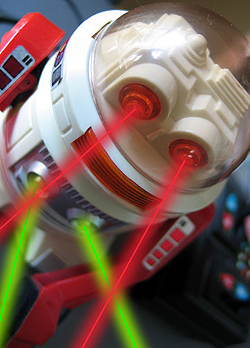Well, I didn’t get my white Christmas, and ironically, the Pacific Northwest was apparently blanketed in snow, but oh well. Maybe next year. I think stepping outside this morning to be hit with 62 degree air is a fair trade-off. Yay global warming?
Speaking of environmental concerns, one of the gifts Santa brought the girls was a DVD of WALL-E, which Matt and I were excited about because we hadn’t seen it yet and so far, Pixar rarely disappoints.
 WALL-E is depressing. I knew nothing about the movie before watching it beyond it being about robots. I guess I was expecting something like, you know, Robots. As Bug’s Life is to Antz, I assumed WALL-E would be to Robots.
WALL-E is depressing. I knew nothing about the movie before watching it beyond it being about robots. I guess I was expecting something like, you know, Robots. As Bug’s Life is to Antz, I assumed WALL-E would be to Robots.
Anyone who knows anything about WALL-E realizes that although the main character is a robot, the movie is not about robots at all. The movie begins by zooming over cityscapes constructed from piles of garbage. There is lots of cute robot action around the planet, which, in spite of being monotonous, somehow manages not to get boring. About a half hour into the movie we meet the human beings.
Humans in WALL-E are totally disconnected from reality and each other, kept in perpetual infancy by robot servants, willingly isolated by virtual screens. This is an obvious satire on the current human condition, in some ways not absurd enough. One of the early jokes shows two men carrying on a conversation via the future version of cell phones, as the two sit right next to each other. This is such typical shtick with cell phones today, that it was almost difficult to see commentary. Other sections were more apt. My favorite line occurs when a character loses his permanent TV and is forced to see what is right before him. “Hey, I didn’t know we had a pool!” is both silly enough to be funny and true enough to be sad.
 Perhaps the least believable thing in this movie is the friendliness of the human characters, and their ability to deal with change. The characters, waited on from birth, do not seem spoiled or self absorbed. Instead they are excited by the prospect of something new, and completely willing to throw their all into fighting a Dinsey-ized Hal. This seems unlikely, but not totally impossible, as the characters do possess a naivete that keeps them childlike, more able to fight hard for what is “fair” and be thrilled by the new. There are other tricky logic areas, but they are easily ignored, and don’t distract much, even with the cynical voice in my brain saying: “and when they landed on earth, they all died because they had no bone or muscle mass, the end.”
Perhaps the least believable thing in this movie is the friendliness of the human characters, and their ability to deal with change. The characters, waited on from birth, do not seem spoiled or self absorbed. Instead they are excited by the prospect of something new, and completely willing to throw their all into fighting a Dinsey-ized Hal. This seems unlikely, but not totally impossible, as the characters do possess a naivete that keeps them childlike, more able to fight hard for what is “fair” and be thrilled by the new. There are other tricky logic areas, but they are easily ignored, and don’t distract much, even with the cynical voice in my brain saying: “and when they landed on earth, they all died because they had no bone or muscle mass, the end.”
For me the most intriguing thing about WALL-E is its preachy goal. I frown on Disney movies trying to teach children life lessons, but the nice thing about any movie is that you have the option of not showing it to your child if you don’t like the message. And there’s nothing subliminal about WALL-E, it would take a pretty dense adult to not catch the message, so if someone is morally opposed to environmentalism they can avoid it. (Preferably by falling in a hazardous waste dump.)
When the movie started, with the zoom-in over our decimated planet, one of my nieces told me, “That’s another planet. Aunt Meagan, that’s not our planet,” and I muttered, “not yet” and left it at that, but WALL-E would at the very least be a conversation starter. I think our planet is in enough trouble that it’s important to start those conversations early. The important question is whether WALL-E starts the right conversation.
An interesting study showed that children who are read a folk tale about George Washington telling the truth about a cherry tree are less likely to lie than children who are read a story about the Boy Who Cried Wolf. This surprised researchers and is a significant statement about human motivators. While WALL-E is clearly a morality story about our impact on the environment, I’d say on the surface it’s 90% the Boy Who Cried Wolf kind of morality and only about 10% George Washington.
There is an “ah-hah” moment, where the clueless captain makes a short speech about how it’s our human responsibility to care for our planet, but this moment is disconnected and far less convincing than the rest. On a story level, it’s difficult to understand how this completely sheltered man could have come to that revelation. While I doubt children watching this movie will be analyzing character development, the captain’s statement is a leap of faith that isn’t really backed up by anything substantial. I suspect for a child viewer, that most important message will be lost among the excitement of WALL-E trying to find EVA.
Maybe the half-hearted statement isn’t for the kids though. Maybe that positive message is better communicated by the fact that once WALL-E, a surprisingly well developed, barely verbal character, acts from the beginning with that sense of responsibility. The care with which WALL-E takes, not only to protect the tiny bean sprout, but the lowly cockroach, has the potential to accomplish what scare tactics alone cannot.
WALL-E, as with all Pixar pictures, is visually impressive and entertaining throughout. The environmental message is at times heavy handed, but in the end it’s a good movie because its characters. The humans are flat, but good enough for peripheral characters. EVA is a so-so supporting character, made more interesting by being a dominant, somewhat violent female character, who rescues at least as much as she is rescued. The cockroach provides the apparently obligatory sidekick, (actually there are many of these) but it’s not personified enough to be annoying. And WALL-E, is wonderful and simple, but still compelling enough to carry both the story and the message. I loved this movie because I loved WALL-E.
6 Replies to “Watching Wall.e”
Comments are closed.